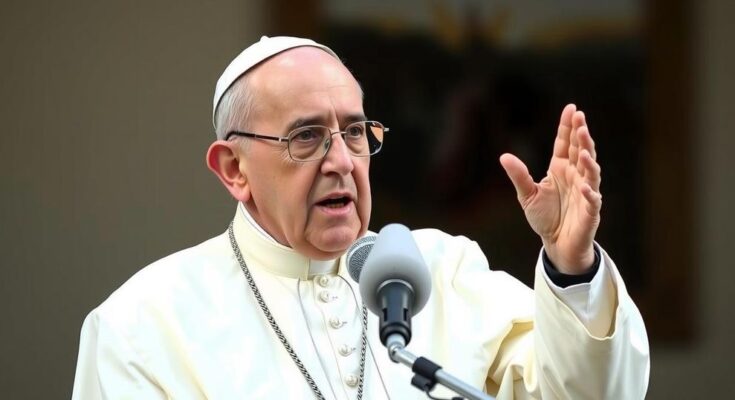Pope Francis emphasized the need for Papua New Guinea’s vast natural resources to benefit all citizens rather than a privileged few. His visit highlighted the stark contrast between the country’s resource wealth and widespread poverty. He also called for an end to tribal violence, advocating for equitable resource management to foster peace and development.
Pope Francis’s recent visit to Papua New Guinea underscored the imperative that the nation’s abundant natural resources must benefit the whole community rather than a select few. Addressing political and business leaders, the pontiff emphasized that the wealth generated from resources such as gold, copper, and gas ought to serve all citizens, particularly considering that many live in extreme poverty. He noted with concern that despite the financial success from these resources, little has changed for the majority of Papua New Guineans, who are facing dire living conditions and limited access to basic services.
The Pope’s appeal comes at a time when Papua New Guinea struggles with the paradox of resource wealth contrasted with widespread poverty, as various multinational companies exploit these resources with minimal local benefit. A World Bank report highlighted that despite a significant increase in the country’s GDP due to resource exploitation, poverty levels remained unchanged over a decade. In light of this, Pope Francis called for equitable resource sharing, ensuring that local communities are considered in economic decision-making processes.
In addition to addressing economic disparities, Pope Francis addressed the issue of tribal violence which has plagued regions of Papua New Guinea. He expressed a deep hope that violent conflicts that have resulted in numerous casualties and displacements among local clans would cease, advocating for peaceful resolutions to foster development. He brought attention to the detrimental impact of modern weaponry on traditional tribal warfare, emphasizing that the root causes of violence stem from contemporary socio-economic challenges.
The pontiff’s visit resonated deeply with the local populace, such as Jonathan Kais from Manus Island, who voiced his hope for governmental change as a response to the Pope’s statement. The visit not only reflects the Pope’s commitment to advocating for social justice but also underlines ongoing issues that Papua New Guinea must confront in harnessing its resources for the collective good of its people.
Papua New Guinea is a nation endowed with immense natural resources, yet it remains one of the poorest nations in the Pacific. Despite a surge in economic growth prompted by the extraction industries, significant portions of the population live in extreme poverty, leading to widespread discontent regarding the distribution of wealth. Ongoing violence and unrest in the country highlight the complexities of resource management and social conflict, making the call for equitable distribution and the cessation of violence more pressing than ever. Pope Francis’s visit to the region highlights a call for a moral and ethical approach to governance and resource distribution, aiming to spur discussions about development that includes all members of society, especially the marginalized.
Pope Francis’s visit to Papua New Guinea serves as a poignant reminder of the moral responsibility that comes with resource wealth. He emphasized that the benefits derived from these resources should reach every member of the community, reinforcing the notion that true progress hinges on equitable access and the alleviation of poverty. Furthermore, his plea to cease tribal violence echoes a broader need for peace and stability to foster genuine development and improve the living conditions for all Papua New Guineans.
Original Source: www.voanews.com




